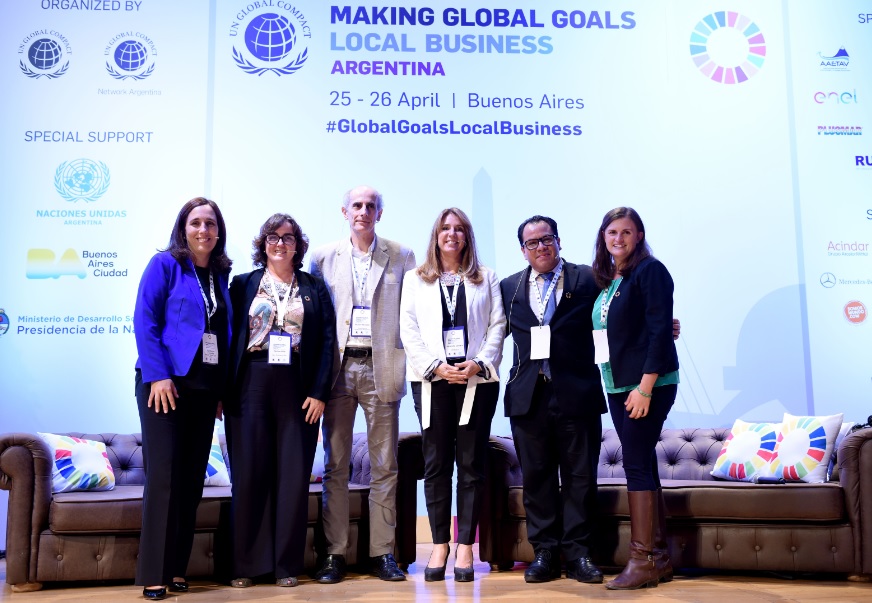Alejandra Cámara, Genesis Director, invited to be a Panelist in the Event
Making Global Goals Local Business – Argentina , 25 to 26 April at La Usina del Arte in Buenos Aires.
In September 2015, all 193 Member States of the United Nations adopted a plan for achieving a better future for all — this plan laid out a path over the next 15 years to end extreme poverty, fight inequality and injustice, and protect our planet. At the heart of the 2030 Agenda are the 17 Sustainable Development Goals (SDGs) which provide a clear roadmap for us to achieve the world we want, ensuring that no one is left behind. The new Global Goals result from a process that has been more inclusive than ever, with Governments involving business, civil society and citizens from the outset. We are all in agreement on where the world needs to go — now it is time to act. Fulfilling these ambitions will take unprecedented effort by all sectors in society, and it is clear that business has a very important role to play in the process.
About Making Global Goals Local Business – Argentina
Organized by the United Nations Global Compact and Global Compact Network Argentina, Making Global Goals Local Business – Argentina will be an important opportunity to demonstrate how strong business, UN and Local Network collaboration is advancing the Ten Principles and the 2030 Agenda in the region. Over the course of two days, the event will bring together over 500 local and global leaders from business, civil society, Government, Global Compact Local Networks and the United Nations to catalyze collective action and impact on the SDGs. As a precursor to global discussions on national SDG progress taking place later this year, the event will be an opportunity for business to play an active role as we begin taking stock of progress across Latin America. As a leading example of multi-stakeholder collaboration, Argentina stands as a strong model for others looking to partner at the country-level.
Launched at the UN Secretary General’s Private Sector Forum in 2017, the “Guide to Unlocking Prosperity: Finance, Investment and Sustainable Development” outlined key actions companies could take to advance the financing for development agenda. Unlocking innovative forms of financing, redirecting existing financial flows towards sustainable development and catalyzing responsible business growth will all be essential. It is essential that the UN, Member States, investors, companies and civil society all work together on this priority agenda.
Panel “Financing for Development”
Facilitated By: Danielle Chesebrough, Senior Analyst Investor Relations, UN Global Compact and Principles for Responsible Investment (Confirmed)
Speakers:
- Alejandra Camara, Advisor Sustainable Finance, Bolsa de Comercio de Buenos Aires and Managing Director, GENISIS (Confirmed)
- Constanza Connolly, Senior Associate, Beccar Varela Law Firm (Confirmed)
- Denise Hills, Superintendent of Sustainability and Inclusive Business, Banco Itau, Brazil (Confirmed)
- Richard Rothenberg, CEO & Co-founder, Global A.I. Corporation (Confirmed)
- Rubén Mercado, Senior Economist, UNDP (Confirmed)
Key Messages :
- There is hardly a more important topic than “Financing the SDGs”. The world will need between $5 trillion and $7 trillion annually to finance the SDGs.
- We will never reach the SDGs without the mobilization of private finance and investment as a complement to public sector investment and funding.
- We at the UN Global Compact – along with partners such as UNEP FI, PRI, and UNCTAD – are working hard to mobilize capital and investment in ways that support the SDGs and the UN’s broader Financing for Development Agenda.
- First, if we are to answer the so-called “billions-to-trillions” challenge, we must activate the critical trillion-dollar financial and investment sub-sectors – including public pension funds, corporate pension funds, institutional asset managers, banks, and insurers. In other words, we must evolve the promising shoots of “impact investing” into a larger movement of “SDG Investing” that fully encompasses mainstream finance.
- Second, we must work harder to challenge and break the tyranny of short-termism that continues to plague so much of business and investment decision-making. This is not in the long-term interest of the private sector, and certainly is not in the long-term interest of the world and the planet.
- Third, we must innovate like never before – uniting public and private investors around new concepts, solutions, and investable instruments that go beyond the important arena of green finance and begin to address SDG needs for which there are few vehicles at the scale needed to attract mainstream finance. We are speaking here of issues such as health, food, water, sanitation, education, gender – and, of course, infrastructure. This work is the focus of the “Financial Innovation and the SDGs” Action Platform, undertaken by the UNGC, UNEP FI, and PRI.
- Fourth, such innovation must be mindful of the fiduciary and risk-adjusted return requirements of investors. In other words, we need to establish the investor case. A recent report, from our sister initiative the Principles for Responsible Investment, does just this – making the case that the SDGs are totally consistent with fiduciary duty.
- Fifth, and finally, we must advocate the importance of a principle-based approach to business investment and finance. It is crucially important the companies and investors understand the importance of “do-no-harm” principles – including the UN Global Compact’s Ten Principles – as they embark on the SDG Agenda. Otherwise, there is the real danger of positive efforts and impacts being eclipsed by negative and harmful practices and effects.
- In all of this, the UN has a special role – as a convener, as a norm-setter, and as a platform to spur action and innovation.
